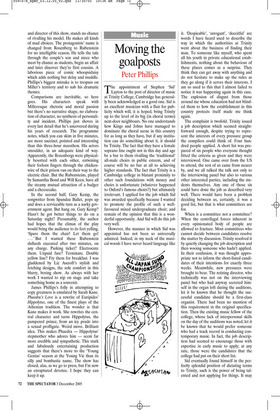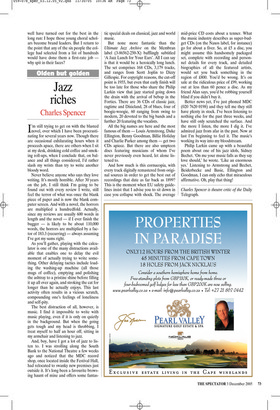Moving the goalposts
Peter Phillips
The appointment of Stephen ‘Sid’ Layton to the post of director of music at Trinity College, Cambridge has generally been acknowledged as a good one. Sid is an excellent musician with a flair for publicity which will, it is hoped, bring Trinity up to the level of its big (in choral terms) next-door neighbours. No one understands how Kings and Johns have managed to dominate the choral scene in this country for as long as they have, but if any institution can do something about it, it should be Trinity. The fact that they have a female soprano line ought not in this day and age be a bar to them rivalling the ‘traditional’ all-male choirs in public esteem, and of course will be no bar at all to achieving higher standards. The fact that Trinity is a Cambridge college in blatant proximity to other such foundations with money and choirs is unfortunate (whatever happened to Oxford’s famous choirs?) but ultimately irrelevant. I applied for the job which Sid was awarded specifically because I wanted to promote the profile of such a wellfavoured mixed undergraduate choir; and remain of the opinion that this is a wonderful opportunity. And Sid will do this job very well.
However, the manner in which Sid was appointed has not been so universally admired. Indeed, in my neck of the musical woods I have never heard language like it. ‘Despicable’, ‘arrogant’, ‘deceitful’ are words I have heard used to describe the way in which the authorities at Trinity went about the business of finding their man. To someone like myself, who spent all his youth in private educational establishments, nothing about the behaviour of these places comes as a surprise. They think they can get away with anything and do not hesitate to make up the rules as they go along if it serves their interests. I am so used to this that I almost failed to notice it was happening again in this case. The explosion of disgust from those around me whose education had not blinded them to how the establishment in this country protects itself made me think again.
The complaint is twofold. Trinity issued a job description which seemed straightforward enough, despite trying to represent the interests of every pressure group the compilers could think of. Four hundred people applied. A short list was prepared of six people who everyone thought fitted the criteria as given and they were interviewed. One came over from the US to attend, the rest of us came from nearer by, and we all talked the talk not only to the interviewing panel but also to various other interested parties, including the students themselves. Any one of those six could have done the job as described very well. There would have been a problem deciding between us, certainly, it was a good list, but that is what committees are for.
When is a committee not a committee? When the centrifugal forces inherent in every opinionated body of people are allowed to fracture. Most committees who cannot decide between candidates resolve the matter by discussion. Trinity resolved it by quietly changing the job description and then wooing someone who hadn’t applied. In their confusion, it was thought appropriate not to inform the short-listed candidates of their intentions for exactly three weeks. Meanwhile, new pressures were brought to bear. The retiring director, who technically was not on the interviewing panel but who had anyway secreted himself in the organ loft during the auditions, let it be known that he thought the successful candidate should be a first-class organist. There had been no mention of this requirement in the original specification. Then the existing music fellow of the college, whose lack of interpersonal skills on the day of the auditions was noted, let it be known that he would prefer someone who had a track record in conducting contemporary music. In fact, the job description had seemed to encourage those with expertise in early music to apply; at any rate, those were the candidates that the college had put on their short list.
Sid eventually found himself in the perfectly splendid position of dictating terms to Trinity, such is the power of being talented and not applying for things. It may well have turned out for the best in the long run: I hope those young choral scholars become brand leaders. But I return to the point that any of the six people the college had selected from a list of hundreds would have done them a first-rate job why spit in their faces?




























































 Previous page
Previous page